
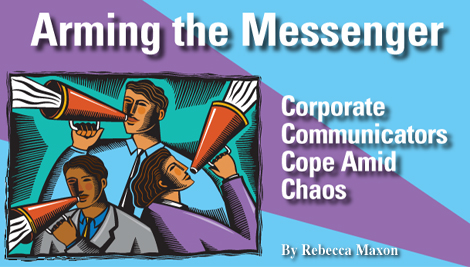
With corporate crises seemingly as common as water-cooler conversations and technology rapidly advancing, the role of the corporate communicator has become more difficult and demanding. These information specialists must be prepared to stem the tide of rumors, mediate among leading corporate decision-makers and deliver clear and concise messages to their internal and external audiences. FDU Magazine spoke with Michael Goodman, director of Fairleigh Dickinson University’s Corporate Communication Institute (CCI), and several graduates of the University’s MA in corporate and organizational communication program for their views on the complex and often chaotic world of corporate communications.
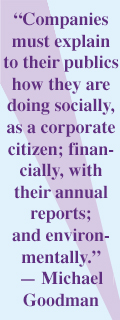
ith Americans tuned into a seemingly endless barrage of accusations of political and corporate wrongdoing, the public has been demanding that American corporations become “transparent” in their operational practices, financial reporting and social responsibility. “Corporate Communication Practices and Trends,” a yearly survey of the chief information officers of Fortune 1000 companies conducted by FDU’s Corporate Communication Institute, identified this “triple bottom line” as the number-one trend in corporate communication this year.
“The best practice is to engage your officers, your public, your community, your employees and your business partners on each of these three fundamental areas,” says English professor Michael Goodman, director of CCI, and director of FDU’s MA in corporate and organizational communication program from 1986–2002.
“I think corporations — from my experience — are really trying to understand the issues and to create more transparency,” says Jo-ann Straat, MA’05 (M), head of corporate affairs at Sankyo Pharma Inc., the second largest drug company in Japan. As the key link between the corporation and its publics, the corporate communicator must work to break down the walls that have often obscured the public’s view inside the corporate entity.
“Companies must explain to their publics how they are doing socially, as a corporate citizen; financially, with their annual reports; and environmentally,” Goodman explains. “Are they good about being a steward of the environment? Are they a good neighbor?”
This “triple bottom line” approach to corporate reporting is the standard throughout the European Union, a major world market, and American organizations wishing to operate there must follow suit.
“General Motors has issued an environmental report for almost 30 years, as do many Fortune 500 to 1000 corporations,” says Goodman. “But this is relatively new for mid-sized companies.”
“Your license to operate a business in a certain area is granted by that community,” Goodman suggests. Businesses not only are required by the state, federal and local governments to have certain licenses; but — to be successful — they also must have the public’s license to operate — its support of the company’s operations.
Even financial reporting has become more exacting than in the past. “The fall of Enron and the egregious acts of its executives led to the passage of Sarbanes-Oxley, which states that senior management is accountable to shareholders with laws enforceable by severe penalties,” according to Christopher Allen, MA’00 (M), vice president of marketing and communications at Financial Executives International (FEI), a professional association of 15,000 chief financial officers, controllers and treasurers. CEOs and CFOs must now attest to the accuracy of their financial reports and face prosecution and jail time if those reports are found to be falsified.
Think Globally, Act Locally
Another trend is the increasingly interrelated nature of society in this global age. “Today’s media and technology are pervasive, instantaneous and global,” a trend that Goodman reports ranks number seven in the 2005 survey. With news of corporate actions spreading throughout the world like wildfire, “Media relations are both more complex and more strategic,” he notes.
Enron’s accounting irregularities had repercussions far beyond the fall of the company and that of its auditing firm. “The state of California’s energy crisis was exacerbated by Enron’s manipulations of the market,” according to Allen.
“It was a lack of understanding of the repercussions downstream,” adds Straat. “They were only thinking on a short-term basis.”
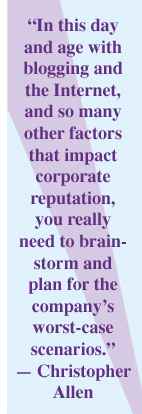
When Arthur Andersen was accused of obstruction of justice in the Enron case, the firm’s communications council said, “pay the fine and move on”; but management, on the advice of corporate lawyers, chose to fight the charges in court. “Unfortunately, by the time the initial conviction was overthrown in a Chicago court, the company had already lost everything in the court of public opinion,” says Goodman. This is one arena of justice that shows no mercy.
“If you think you can do something in this town,” says Goodman, “and not have it reverberate throughout the world, you haven’t been on the Internet.” Web technology such as Really Simple Syndication (RSS) and consumer-generated media have made the world of media and public relations more complex and the skills required to handle public image more strategic.
“In this day and age,” Allen says, “with blogging and the Internet, and so many other factors that impact corporate reputation, you really need to brainstorm and plan for the company’s worst-case scenarios.”
“Merrill Lynch had a similar situation to Arthur Andersen’s,” Goodman compares. “They learned from Arthur Andersen and quickly said, ‘Excuse me [New York State Attorney General] Eliot Spitzer, but how much do we owe you?’ A company’s reputation is very tangible and fleeting — it’s hard to earn and easy to lose.”
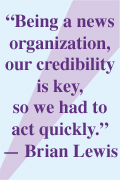
Hope Springs Eternal, But Trust?
Particularly in the financial reporting, says Allen, trust is so important that accounting inaccuracies can make or break a company. “Our world at FEI is financial reporting. That’s the intersection between the corporation and the shareholders — the financial data. With the investor community, the financial data carries with it the perceived value of the company.”

Beyond monitoring the bottom-line figures, focusing on the company’s reputation and developing relationships with the media, corporate communicators need to be ready when things go wrong. “When you’re in a crisis situation, you have to be honest and respond quickly,” says Brian Lewis, MA’96 (T), senior vice president of corporate communication at Fox News Corp. in Manhattan. “And you have to speak with one voice.”
One difficult situation at Fox News actually occurred because of modern technology. Lewis explains, “During the election campaigns, a beat reporter wrote a mock script following a debate which joked that one of the candidates was a ‘metrosexual’ — meaning an urban male who spends a great deal of time and money on his appearance and lifestyle. The script was passed around a bit via e-mail — until somebody mistook it for real and posted it on our Web coverage.”
“Within the hour calls came in and we realized what had happened. Being a news organization, our credibility is key, so we had to act quickly.”
Because of a strong corporate culture of honesty, the solution was easily decided: “Admit the mistake and move on.” The situation turned into a one-day story. “If you don’t react quickly,”says Lewis, the blogger will do it for you.” And it’s not likely to be a positive reaction.
Plan, Plan, Then Plan Some More
It comes down to planning. A corporation must be meticulous about its crisis management plans, and a large portion of the corporate communicator’s time is focused on what to do in times of crisis. “Your company will have a crisis; and it is important to be prepared for even the ones you can’t imagine,” urges Goodman. The inconceivable does happen, and frequently at that. “Global terrorism makes crisis communications planning a critical success factor,” he emphasizes.
Natural disasters, social unrest, war and pestilence are all crises with global impact and challenges for corporations. Preparedness for handling disasters and crises is under intense scrutiny and can make headlines. One major example is the Federal Emergency Management Agency (FEMA) during Hurricane Katrina and its aftermath. But even those not directly charged with disaster and crisis management are subject to scrutiny. A report on National Public Radio News (11/9/05) commented that the makers of Kentucky Fried Chicken have implemented a crisis preparedness plan for an avian flu pandemic, including television commercials that would reassure the public of the safeness of its chicken, produced and ready for airing if necessary.
Let Your Conscience Be Your Guide
Besides having a direct effect on routine business operations, a major disaster holds the opportunity for corporations to demonstrate world citizenship and social responsibility. Increasingly, the chief communication officer acts as the “conscience” of the organization, charged with building a responsible, ethical and socially responsive culture inside the world of big business.
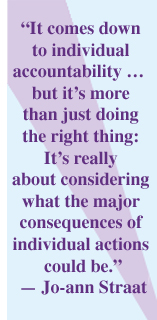
“It comes down to individual accountability,” Straat says. “One person can bring a corporation down, but it’s more than just doing the right thing: It’s really about considering what the major consequences of individual actions could be. I think good corporations — from my experience in the pharmaceutical industry — are really trying to understand the issues and to create more transparency,” says Straat.
Goodman adds, “It all loops back to corporate culture. All the way up and down the company you want to foster a culture of accountability. It’s part of who you hire and how you train them.”
Straat says, “Corporate communicators bring the culture to life in several ways. One is to live it — to exemplify those behaviors you are looking for in the company’s employees. And, when we bring in a new hire, we talk about culture right from the beginning.
“Training has become part of our culture,” she continues. In a highly regulated industry such as pharmaceuticals, “Good corporations are making sure their employees — not only senior management — are aware of regulations and understand the importance of compliance.”

Citizenship First
Christina Genest, MA’04 (M), assistant director of CCI, says, “If you have a culture of accountability and a culture of strong values, then caring about your local community and the global community is going to be part of who you are, because it’s the only way you are going to be successful. It gives you license to operate and motivates your employees.”
Look at it in terms of the New Orleans disaster,” says Genest. “Wal-Mart was there before anybody.” The company set up distribution centers to bring basic necessities to people in hurricane shelters within days of the storm’s landfall.
In 1970, economist Milton Friedman wrote, “There is one and only one social responsibility of business — to use its resources and engage in activities designed to increase its profits.” The shareholder was the one the corporation was fiducially responsible to. Now, Goodman says, “The best practice is 180 degrees away from that.” CCI’s research indicates that, “Corporations are expected to be not only profitable but also to be good citizens.”
“Philanthropy becomes part of the overall corporate social responsibility plan,” Goodman adds. “When you talk about corporate social responsibility, Americans will focus right into the contribution dollars that go out.”
The media pay attention to such things as well. Look at the press coverage of Hurricane Katrina: “Fortune had as the cover story the corporate response to Katrina,” Allen says. “You had FedEx, Home Depot and others acknowledged for getting the job done.”
With the trend toward transparency in financial, social and environmental areas; today’s pervasive and instantaneous communications outlets; the ever-increasing need to plan ahead for corporate crises; and the demand that corporations not only earn a profit but are good citizens as well, corporate communicators have seen their jobs change and grow in sometimes drastic ways. “I think that corporate communicators have learned in the past few years that the counsel of the communication officer is going to be just as valuable, in fact more so, than the advice of the corporate council or corporate lawyer,” Goodman concludes. And FDU’s graduate and undergraduate programs will prepare many for this vital role.
Rebecca Maxon, MA’00 (T), is an alumna of the MA in corporate and organizational communication program.
FDU Magazine Home | Table of Contents | FDU Home | Alumni Home | Comments
©Copyright 2006 Fairleigh Dickinson University. All rights reserved.
For a print copy of FDU Magazine, featuring this and other stories, contact Rebecca Maxon, editor,
201-692-7024 or maxon@fdu.edu.